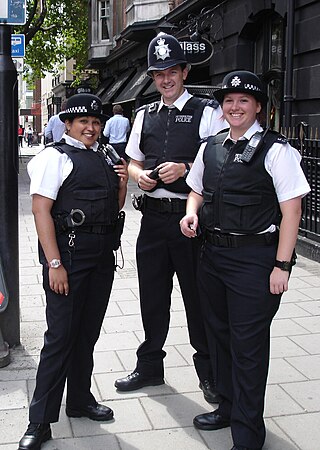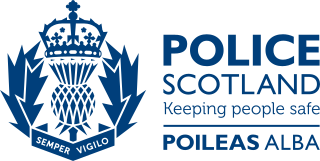
Forensic science, also known as criminalistics, is the application of science principles and methods to support legal decision-making in matters of criminal and civil law.

Law enforcement in the United Kingdom is organised separately in each of the legal systems of the United Kingdom: England and Wales, Scotland, and Northern Ireland. Most law enforcement duties are carried out by those who hold the office of police constable of a territorial police force.

The Serious Organised Crime Agency (SOCA) was a non-departmental public body of the Government of the United Kingdom which existed from 1 April 2006 until 7 October 2013. SOCA was a national law enforcement agency with Home Office sponsorship, established as a body corporate under Section 1 of the Serious Organised Crime and Police Act 2005. It operated within the United Kingdom and collaborated with many foreign law enforcement and intelligence agencies.

The Australian Criminal Intelligence Commission (ACIC) is a law enforcement agency established by the Australian federal government on 1 July 2016, following the merger of the Australian Crime Commission (ACC) and CrimTrac. It has specialist investigative capabilities and delivers and maintains national information sharing systems. ACIC is part of the National Intelligence Community.

West Midlands Police is the territorial police force responsible for policing the metropolitan county of West Midlands in England.
The Police National Computer (PNC) is a database used by law enforcement organisations across the United Kingdom and other non-law enforcement agencies. Originally developed in the early 1970s, PNC1 went 'live' in 1974, providing UK police forces with online access to the lost/stolen vehicle database. The vehicle owners application quickly followed, giving the police online access to the names/addresses of every vehicle owner in the UK.

An authorised firearms officer (AFO) is a British police officer who is authorised and trained to carry and use firearms. The designation is significant because most police officers in the United Kingdom do not routinely carry firearms. The only forces where officers are routinely armed are the Police Service of Northern Ireland, the Ministry of Defence Police, the Civil Nuclear Constabulary, Belfast Harbour Police and the Belfast International Airport Constabulary.

The National Policing Improvement Agency (NPIA) was a non-departmental public body in the United Kingdom, established to support police by providing expertise in such areas as information technology, information sharing, and recruitment.
Calvin Hooker Goddard was a forensic scientist, army officer, academic, researcher and a pioneer in forensic ballistics. He examined the bullet casings in the 1929 St. Valentine's Day Massacre and showed that the guns used were not police issued weapons, leading the investigators to conclude it was a mob hit.
The Integrated Ballistics Identification System, or IBIS, is the brand of the Automated firearms identification system manufactured by Forensic Technology WAI, Inc., of Montreal, Canada.

The National Crime Agency (NCA) is a national law enforcement agency in the United Kingdom. It is the UK's lead agency against organised crime; human, weapon and drug trafficking; cybercrime; and economic crime that goes across regional and international borders, but it can be tasked to investigate any crime. The NCA has a strategic role as part of which it looks at serious crime in aggregate across the UK, especially analysing how organised criminals are operating and how they can be disrupted. To do this, it works closely with regional organised crime units (ROCUs), local police forces, and other government departments and agencies.

Police Scotland, officially the Police Service of Scotland, is the national police force of Scotland. It was formed in 2013, through the merging of eight regional police forces in Scotland, as well as the specialist services of the Scottish Police Services Authority, including the Scottish Crime and Drug Enforcement Agency. Although not formally absorbing it, the merger also resulted in the winding up of the Association of Chief Police Officers in Scotland.
The Government of the United Kingdom maintains several intelligence agencies that deal with secret intelligence. These agencies are responsible for collecting, analysing and exploiting foreign and domestic intelligence, providing military intelligence, and performing espionage and counter-espionage. Their intelligence assessments contribute to the conduct of the foreign relations of the United Kingdom, maintaining the national security of the United Kingdom, military planning, public safety, and law enforcement in the United Kingdom. The four main agencies are the Secret Intelligence Service, the Security Service (MI5), the Government Communications Headquarters (GCHQ) and Defence Intelligence (DI). The agencies are organised under three government departments, the Foreign Office, the Home Office and the Ministry of Defence.

Sir David Thompson is the former chief constable of West Midlands Police, England's second-largest and the United Kingdom's third-largest police force. He retired from the post on 5 December 2022, succeeded by Craig Guildford.

Forensic firearm examination is the forensic process of examining the characteristics of firearms or bullets left behind at a crime scene. Specialists in this field try to link bullets to weapons and weapons to individuals. They can raise and record obliterated serial numbers in an attempt to find the registered owner of a weapon and look for fingerprints on a weapon and cartridges.

Counter Terrorism Policing is the national collaboration of police forces working to prevent, deter, and investigate terrorism in the United Kingdom.

Crime in Greater Manchester has the second-highest incidence in England and Wales after Greater London. Crime in Greater Manchester is the responsibility of the GMP. Its PCC was abolished in May 2017.












